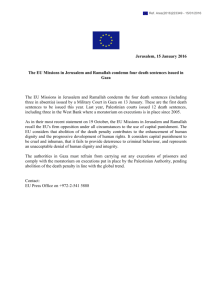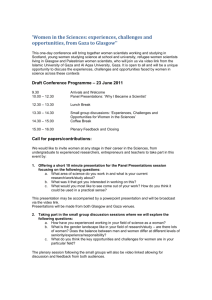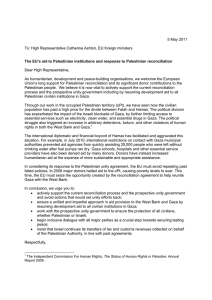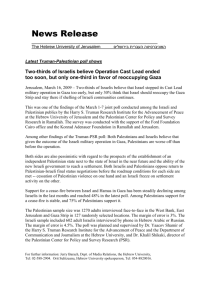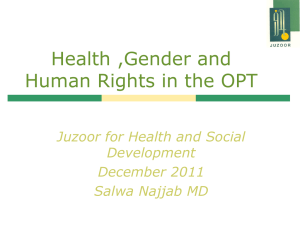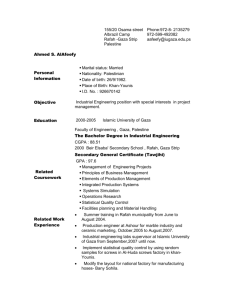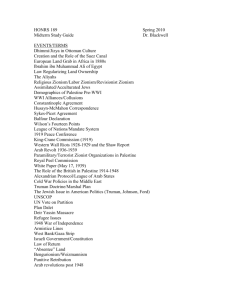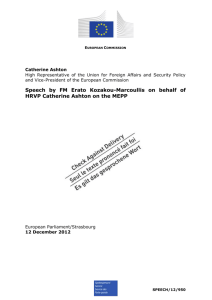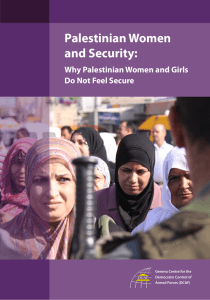Palestinian children in armed conflict Report
advertisement
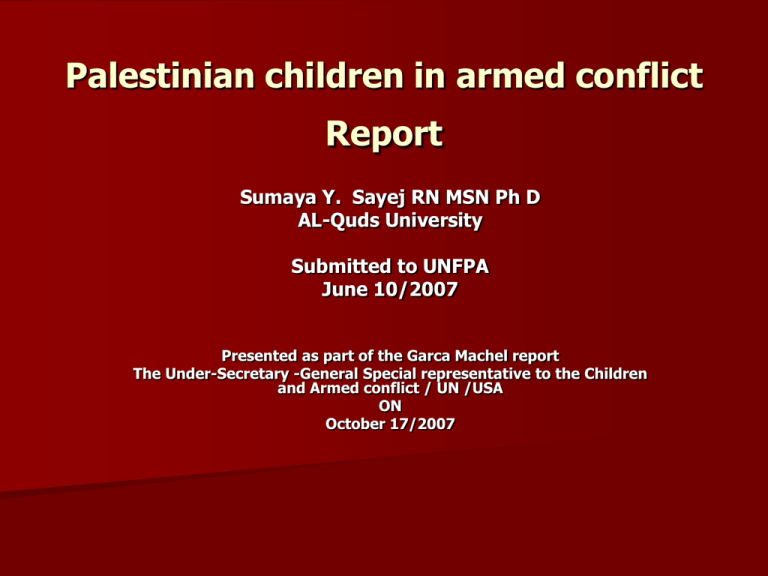
Palestinian children in armed conflict Report Sumaya Y. Sayej RN MSN Ph D AL-Quds University Submitted to UNFPA June 10/2007 Presented as part of the Garca Machel report The Under-Secretary -General Special representative to the Children and Armed conflict / UN /USA ON October 17/2007 Introduction The study design was based on Graca Machel Study questions and has followed the attached facilitator’s guide to conduct focus groups with children on “working together to protect children in armed conflict”. The study aimed to gain insight into how the children themselves are affected by the armed conflict, the way they view their situation, challenges, and coping mechanisms they or someone in their communities has taken to help them, and efforts made to protect them and grant them their rights Sample selection and size The sample selection took into account; age group (10-13 years and 14-18 years), gender (where girls and boys were represented in equal proportion) and place of residence (West Bank and Gaza). Permission to conduct the focus group discussion was granted from school directors 93 children in 9 focus groups with an average of (8-14) children in each group participated in the discussion from both sides of the Palestinian Occupied territories; 5 focus groups from Ramallah region in the middle of the West Bank and 4 focus groups from Biet Hanoun region in the north of Gaza Strip. The participants were vocal and got the confidence to express their views, the discussion was lively, and sense of respect toward each other was noted, also appreciated being asked about their QUESTIONS FOR FOCUS GROUPS Consequences of war What are the greatest challenges you have faced as a result of conflict? Are these challenges different for boys and girls, and do they differ according to the ages of the children and youth? Coping with war What is the best action you or someone in your community has taken to help with the problems children face because of conflict? What has your government done to respect, protect and fulfill the rights of war-affected children? What have about humanitarian agencies such as the UN and NGOs done to respect, protect and fulfill the rights of war-affected children? How have diplomatic efforts, such as resolutions and treaties prepared by the UN and its member states, have helped children affected by armed conflict? Peace and reconciliation What do you think has been the most important factor towards advancing a peace process and building reconciliation in your community and/or country? What opportunities are there for young people to participate and express their concerns? Recommendations Are there any issues and/or groups of young people who are affected by conflict that have not been mentioned and should be addressed? What would you recommend to be done – and by who – so that all children affected by conflict have their rights respected, protected and fulfilled? Findings A number of issues were identified by the children which constitute risk factors that they need to challenge: Broadly, the children responses can be grouped as describing problems derived from their: Sense of security Socio-economic and educational difficulties, Issues associated with conflict - related violence. What are the greatest challenges you have faced as a result of conflict? There was a relative difference in the responses of children between both regions; this difference is assumed to depend on the type of exposure to violence, the source of threat, and the extent of this threat to jeopardize their lives. The exposure of Gaza children to extreme armed conflict inflicted by the continuous and unpredictable brutal attacks by the Israeli army and jet strike made them feel that their life is threatened, and consequently increased their worries, felt unsafe and frustrated as for example; Yassar 12 years old added, “I’m afraid that the Israelis will shoot me and demolish our house over our heads”. Mahmoud 10 from Gaza said “I ask my mother to let me sleep in her room during the Israeli attacks”, Hassan 11 added “I hate nights because it scares me”, On the other side; the majority of West Bank children concerns were related to the discriminating wall; they expressed sense of insecurity, loss of freedom and the feeling of being under surveillance have increased their sense of rage, humiliation and disrespect. Coupled with the enormous check points and personal search for every Palestinian going through these points; the children considered it as another demeaning factor that makes them feel oppressed and frustrated and most of the girls and boys expressed the feeling anxiety and worried to go through these check points as Fadel 17 from Ramallah said “we are always under pressure and really this is not a kind of life that any human being should live”. Formal and informal sources agree that domestic violence has been on a steady rise since the outset of the second Intifada. Violence creates violence an expression made by Itidal 16 years girl from Ramallah The majority of the children expressed concerns regarding the growing violence in their localities at different levels including the family, school and street. With emphasis on domestic violence, the children from all regions have discussed the issue, and some of them have had the experience as Yara 14 from Ramallah area said “my father is used to hit my mother and all of us, he has no job and the family needs are enormous, the only way for him to express his frustration is by shouting and hitting The issue of economy and financial status was of major concern expressed by the interviewed children 14-18 years in both regions. The children reported that they themselves had less pocket money, their parents have limited resources, and that they have observed changes in how family members interacted with each other regarding these matters Economic decline and lack of financial and/or physical access to schools has resulted into thousands of children have not had regular classes in their schools The major concerns expressed by the children interviewed were about the quality and effectiveness of the education they received through the last academic year, as Dana 16 years said “this is a year of ignorance” The girls explicitly were more of concern than boys regarding the frequent school closures as they consider school a place for socialization as stated by some "school is a place that we can go and socialize", other girls said "school gives us a chance to exchange stories and ideas". What is the best action you or someone in your community has taken to help with the problems children face because of conflict? Most children expressed their coping mechanisms and means of help to face the challenges of conflict and to improve their lives is primarily by developing academically and socially as Salah , Issa, Maram and others said “the best way to cope and to develop is to finish our education Others reflected their coping mechanisms by engaging themselves in extra curricular and social activities that seems to be constructive and positive in nature as said by Ibrahim, Suzan and others from Ramallah "we enjoy volunteering in any social and national events in our area of residence or the school". Gaza children coping mechanisms and social involvement have reflected their tragic situation as Mohammad 18 and others said “we participate in demonstrations, and many times we were exposed to violence” while Majed and Munir said “many times we helped other families in evacuating their houses before it was bombarded”. Generally, the children were influenced by the events and circumstances and were enthusiastic to cope with this given situation and to be active participants in their surroundings While most of the children appraised the role of their families in supporting and protecting them, as Asheera, Itidal and many others said “our families are our hope and the only source of help”. Others raised concerns regarding the helplessness of their families to secure and protect their children as said by some Nidal, Issa, Haneen and many others “our families need help”. Generally, the children were influenced by the events and circumstances and were enthusiastic to cope with this given situation and to be active participants in their surroundings What has your government done to respect, protect and fulfill the rights of war-affected children? Some children described the government as helpless and cannot protect any one, and do not expect any thing from this government as many said “the government in siege, how can it be of help”. Tareq, and others found an excuse to the government performance as said “the government is loaded with the political issues”. Mohammad 18 appraised the role of government in offering free health and education services for children. On the contrary, the majority were critical to the Palestinian Government role in providing the minimum requirement to protect the Palestinian children’s rights to survival as Abdulla 16 from Gaza said “the government personnel are busy to keep themselves on their seats”. What have about humanitarian agencies such as the UN and NGOs done to respect, protect and fulfill the rights of war-affected children? Iyad from Gaza said hesitantly “safety, protection, respect, these are terms that we hear about but do not have it” while Munir 17 from Gaza commented “no one is safe, at any time, the Israelis can invade the land, kill the people and kidnap the young men and no one can stop them”. Many children especially those who live in camps are aware of UNRWA as a major UN humanitarian agency that provides them with assistance and appreciate its role in offering free education and health services. Some children in Gaza appreciated the role of UNRWA in renting apartments for whose their houses have been demolished until they can rebuild them again Some other children appreciated the help and support they get from local NGOs supported and funded by UN particularly UNFPA through the many projects which is indirectly contributing to the development and empowerment of Palestinian children and adolescents Some children were aware of UNICEF role in offering counseling and education about taking precautionary and safety measures regarding land mines and shelling in Gaza as Fidaa said “we appreciate what UNICEF is offering us through awareness program they offer” Many children appreciated the role of the Red Cross in helping their families and beloved prisoners by visiting them and helping in knowing about any detainee by the Israelis. Other children particularly from villages were the least to have any support even by the local NGOs except for some activities provided by Sheikhs and religious leaders in their communities How have diplomatic efforts, such as resolutions and treaties prepared by the UN and its member states, have helped children affected by armed conflict? The majority of the children 14-18 and agreed to the useless diplomatic efforts and Peace treaties proposed by UN and international communities. Mohammad 18 and Fidaa 17 and many others commented “despite the continuous diplomatic efforts and resolution acts been made by UN for the last 60 years, nothing was implemented on the ground”. When referred to the UN declaration of children’s rights; no one agreed to that and believed all Palestinian citizens human rights including the children have been violated. Peace and reconciliation The majority agreed that peace process can be advanced if all UN resolution acts are implemented and Palestinians can get their rights to return, end of occupation and Jerusalem is the capital for the Palestinian state Many children emphasized the importance of negotiations that should be back on track as Bahjat and Issa from Ramallah said. Some children opposed these comments and said “we hear about diplomatic efforts, but it is ink on papers”, “there is no peace” etc... Many children emphasized the importance of reconciliation among Palestinian themselves and the importance of unity to make them stronger and live in peace together as someone said “it is not enough to have the Israelis, we have ourselves to fight each other”. Few particularly from Gaza and from the older age group believed in the return of all historic Palestine What opportunities are there for young people to participate and express their concerns? The majority agreed to the limitation of opportunities for them to express their needs and concerns not because they are not allowed to speak out but because of the deteriorating and constrictive environment and lack of opportunities to do so. for example; Nidal and others said “we play sports in the neighborhood as alternative to playgrounds”. Few children have the opportunity to participate in some extracurricular activities through some local organizations as, but many others were critical as said “how many children do benefit or have an access to these NGOs”. Some girls and others emphasized the importance of the use of the computer and net Mohammad and Tareq from Gaza commented “the impact of socioeconomic and political situation has contributed to increase the children affiliation with either political or religious groups as a mean to express their views and channel their energies”. Recommendations Are there any issues and/or groups of young people who are affected by conflict that have not been mentioned and should be addressed? The older age group mentioned four important issues regarding child care and right to live in dignity that should be addressed by the Palestinian government, NGOs and UN agencies: disabled children who got injured by the Israeli army and the importance of their integration into the society, education and in finding job opportunities for them. Care for orphanage children who are numerous as a result of their father deaths due to struggle or any other orphan and lack institutional or any source of assistance. To work on releasing the arrested children, those below the age of 18 and currently being held in Israeli detention facilities. And last to work on DEPORTIEES whom were obliged to leave their own homes into other places. What would you recommend to be done – and by who – so that all children affected by conflict have their rights respected, protected and fulfilled? Promote the governmental institutions effectiveness in executing constructive programs related to children rights with monitoring and follow up for these programs; “many times we hear about a program, then it is not there” Development of the media campaigns to raise awareness of the society regarding the children’s rights Demand from the international community to provide rights and safety for Palestinian children and to expose all inhuman acts done by Israelis against children Provision of rehabilitative services for all injured, disabled, detained and orphan Palestinian children Launch awareness programs for the parents and teachers to be able to deal with children in such armed conflict situatio
